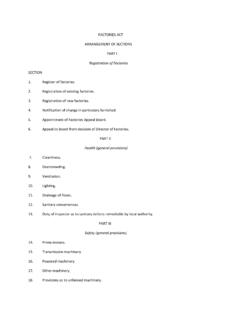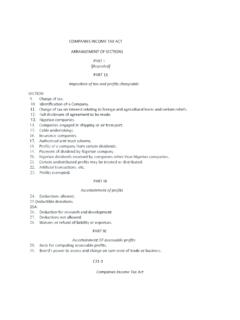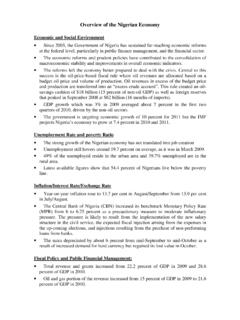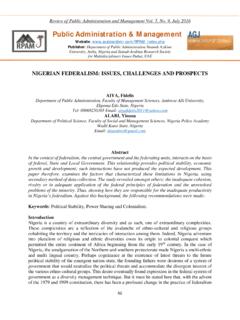Transcription of POLICE ACT - PLAC - 2004 Laws of Nigeria
1 POLICE ACT. ARRANGEMENT OF SECTIONS. PART I. Short title and interpretation SECTION. 1. Short title. 2. Interpretation. PARTII. Constitution and employment of the force 3. Establishment of POLICE Force. 4. General duties of the POLICE . 5. Constitution of the Force. 6. Command of the Force. 7. Duties of the Deputy Inspector-General of POLICE . 8. Duties of an Assistant Inspector-General. 9. Establishment of the Nigeria POLICE Council. 10. Public safety and public order. 11. Delegation by Inspector-General. 12. Command of POLICE in case of active service. PART III. General administration Oaths for officers 13. Oaths to be taken by officers on appointment. Enlistment and service 14. Enlistment. 15. Extension of term of enlistment in special cases.
2 16. Declarations. 17. Re-engagement. Supernumerary POLICE officers 18. Appointment of supernumerary POLICE officers to protect property. 19. Appointment of supernumerary POLICE officers for employment on administrative duties on POLICE premises. 20. Appointment of supernumerary POLICE officers where necessary in the public interest. 21. Appointment of supernumerary POLICE for attachment as orderlies. SECTION. 22. Provisions supplementary to sections 18 to 21. PART IV. Powers of po lice officers 23. Conduct of prosecutions. 24. Power to arrest without warrant. 25. Power to arrest without having warrant in possession. 26. Summonses. 27. Bail of person arrested without warrant. 28. Power to search. 29. Power to detain and search suspected persons.
3 30. Power to take fingerprints. PART V. Property unclaimed, found or otherwise 31. Court may make orders with respect to property in possession of POLICE . 32. Perishable articles. PARTVl Miscellaneous provisions 33. The POLICE Reward Fund. 34. Crying down credit. 35. Pay of constables not to be withheld for debt: exception. 36. POLICE officers not to engage in any private business. PART VII. Offences 37. Offences. 38. Apprehension of deserters. 39. Assault on POLICE officer. 40. Refusing to aid POLICE officer assaulted. 41 . Harbouring constable. 41. Personation of POLICE officer. 42. Obtaining admission into Force by fraud. 43. Ordinary course of law not to be interfered with. 44. Persons acquitted by court not punishable on same charge under this Act, nor if convicted, except by reduction.
4 PART VIII. Regulations and standing orders 46. Power to make regulations. 47. Standing orders. PART IX. Application SECTION. 48. Application of Act to persons already serving. PART X. Special constables 49. The nigerian Special Constabulary. 50. Appointment of special constables in normal circumstances. 51. Resignation, suspension and dismissal of constables appointed under section 50. 52. Appointment of emergency special constables. 53. Provisions supplementary to section 52. 54. Equipment. 55. Instruction of special constables. 56. Allowances, pensions, etc. 57. Interpretation. 58. Repeal and transitional provisions. PART XI. Traffic warden service 59. Establishment of the Traffic Warden Service. 60. Appointment of the traffic wardens.
5 61. Period of service. 62. Powers, etc., of a traftic warden. 63. Certificate of appointment and of discharge. 64. Ranks of traffic wardens. 65. Resignation. 66. Discipline. 67. Provision of equipment. 68. Delegation of powers by Inspector-General. 69. Instruction of traffic warden, etc. CHAPTER P19. POLICE ACT. An Act to make provision for the organisati on, discipline, powers and duties of the POLICE , the s pecial constabulary and the traffic wardens. [1967 No. 41.]. [1st April, 1943]. [Commencement.]. PART I. Short title and interpretation 1. S hort titl e This Act may be cited as the POLICE Act. 2. Interpretati on In this Act, unless the context otherwise requires- [1979 No. 23.]. "Commissioner" means a Commissioner of POLICE , a Deputy Commissioner of Po- lice or an Assistant Commissioner of POLICE .
6 "constable " means any POLICE officer below the rank of corporal;. "court" means any court established by any law in force in Nigeria ;. "the Force " means the Nigeria POLICE Force established under this Act;. "i ns pector" includes a chief inspector and an inspector of POLICE ;. "Ins pector -General ", "Deputy Ins pector -General " and "Assistant Ins pector - General " means respectively the Inspector-General of POLICE , the Deputy Inspector- General of POLICE and an Assistant Inspector-General of POLICE ;. "non-commissioned offi cer " means a POLICE sergeant-major, a POLICE sergeant or a POLICE corporal as the case may be;. " POLICE officer" means any member of the Force;. "superi ntendent of POLICE " includes a chief superintendent of POLICE , a superinten- dent of POLICE , a deputy superintendent of POLICE , and an assistant superintendent of po- lice.
7 "superi or POLICE officer" means any POLICE officer above the rank of a cadet assistant superintendent of POLICE ;. "supernumerary POLICE officer " means a POLICE officer appointed under section 18, 19 or 21 of this Act or under an authorisation given under section 20 of this Act. PART II. Constitution and employment of the Force 3. Es tablis hment of POLICE Force There shall be established for Nigeria a POLICE force to be known as the Nigeria POLICE Force (in this Act referred to as "the Force"). 4. General duties of the POLICE The POLICE shall be employed for the prevention and detection of crime, the apprehen- sion of offenders, the preservation of law and order, the protection of life and property and the due enforcement of all laws and regulations with which they are directly charged, and shall perform such military duties within or outside Nigeria as may be required of them by, or under the authority of this or any other Act.
8 [1979 No. 23.]. 5. Constitution of the Force There shall be an Inspector-General of the Nigeria POLICE , such number of Deputy In- spectors-General, Assistant Inspectors-General as the Nigeria POLICE Council considers appropriate, a Commissioner for each State of the Federation and such ranks as may, from time to time, be appointed by the Nigeria POLICE Council. [1979 No. 23.]. 6. Command of the Force The Force shall be under the command of the Inspector-General, and contingents of the Force stationed in a State shall, subject to the authority of the Inspector-General, be under the command of the Commissioner of that State. 7. Duties of the Deputy Inspector-General of POLICE (1) A Deputy Inspector-General is the second in command of the Force and shall act for the Inspector-General in the Inspector-General's absence from Force Headquarters.
9 (2) When acting for the Inspector-General, the Deputy Inspector-General shall be guided by the following- (a) all matters involving any change in Force policy shall be held in abeyance pending the return of the Inspector-General or, if the matter is urgent, referred directly to the Inspector-General for his instructions;. (b) all matters of importance dealt with by the Deputy Inspector-General during the absence of the Inspector-General shall be referred to the Inspector-General on his return. 8. Duties of an Assistant Inspector-General (1) An Assistant Inspector-General shall be subordinate in rank to the Deputy In- spector-General but shall be senior to all commissioners. (2) An assistant Inspector-General shall act for the Inspector-General in the absence of both the Inspector-General and the Deputy Inspector-General and when so acting, the provisions of paragraphs (a) and (b) of subsection (2) of section 7 of this Act shall, with all necessary modifications, apply to him.
10 9. Establishment of the Nigeria POLICE Council (1) There is hereby established a body to be known as the Nigeria POLICE Council (in this Act referred to as "the Council") which shall consist of- (a) the President who shall be chairman;. (b) the Governor of each State of the Federation;. (c) the chairman of the POLICE Service Commission;. (d) the Inspector-General of POLICE . (2) The functions of the Council shall include- (a) the organisation and administration of the Nigeria POLICE Force and all other matters relating thereto (not being matters relating to the use and operational control of the Force, or the appointment, disciplinary control and dismissal of members of the Force);. (b) the general supervision of the Nigeria POLICE Force.













